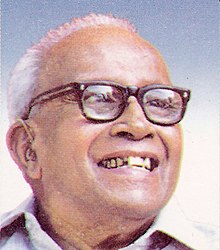E. M. S. Namboodiripad | |
|---|---|
 | |
| 1st Chief Minister of Kerala | |
| In office 6 March 1967 – 1 November 1969 | |
| Preceded by | President's rule |
| Succeeded by | C. Achutha Menon |
| In office 5 April 1957 – 31 July 1959 | |
| Preceded by | Office Established |
| Succeeded by | Pattom Thanu Pillai |
| General Secretary of Communist Party of India | |
| In office 29 April 1962 – 11 April 1964 | |
| Preceded by | Ajoy Ghosh |
| Succeeded by | Chandra Rajeswara Rao |
| General Secretary of Communist Party of India (Marxist) | |
| In office 8 April 1978 – 9 January 1992 | |
| Preceded by | P. Sundarayya |
| Succeeded by | Harkishan Singh Surjeet |
| Personal details | |
| Born | Elamkulam Manakkal Sankaran Namboodiripad 13 June 1909 Perinthalmanna, Madras Presidency, British India (Present day Malappuram district, Kerala, India) |
| Died | 19 March 1998 (aged 88) Thiruvananthapuram, Kerala, India |
| Political party | Communist Party of India (Marxist) (from 1964) Communist Party of India (before 1964) |
| Spouse | Arya Antharjanam (1937–1998)[1] |
| Children | 4[2] |
| Residence | Thiruvananthapuram |
| Alma mater | St. Thomas College, Thrissur |
| Known for | Co-founder of Communist Party of India (Marxist) |
| Website | Government of Kerala |
Elamkulam Manakkal Sankaran Namboodiripad (13 June 1909 – 19 March 1998), popularly known as 'E.M.S. Namboodiripad' or simply by his initials 'E. M. S.', was an Indian communist politician and theorist, who served as the first Chief Minister of Kerala in 1957–1959 and then again in 1967–1969. As a member of the Communist Party of India (CPI), he became the first non-Congress Chief Minister in the Indian republic. In 1964, he led a faction of the CPI that broke away to form the Communist Party of India (Marxist) (CPI(M)).
As chief minister, EMS pioneered radical land and educational reforms in Kerala, which helped it become the country's leader in social indicators. It is largely due to his commitment and guidance that the CPI(M), of which he was Politburo member and general secretary for 14 years, has become such a domineering political force, playing a vital role in India's new era of coalition politics.[3]
- ^ "EMS' wife passes away". The Times of India. Retrieved 21 February 2019.
- ^ "E.M. Sreedharan dead". The Hindu. 15 November 2002. Retrieved 6 June 2018.[dead link]
- ^ Singh, Kuldip (1 April 1998). "Obituary: E. M. S. Namboodiripad". The Independent. Retrieved 20 May 2018.